A selection of Terrasses du Larzac growers (2/3)
David Furer continues his article on the Languedoc region called Terrasses du Larzac with some of his favourite producers. The Terrasses du Larzac is a sub-region in the northern part of the Languedoc where you can find many high quality producers. Here is the second instalment of David’s selection of producers.
Château de Jonquières
François and Isabelle de Cabissole and their daughter Charlotte (who decided during her third year of business studies to return to the family business with the help of her husband Clement) live in the 12th-17th century Château de Jonquières, inheriting it from François’s grandmother as had been done by six related families since its inception, surrounded by the ‘village goods’ vineyards of the smallest surface area commune areas in l’Hérault.
They own 29 acres (12 ha) in total with only 15 (6) planted, purchasing none. The house white made from Chenin and Grenache blanc is released late, and is complete and round upon release. A light rosé both in nose and palate, minerally and understated, with its 90% Cinsault.
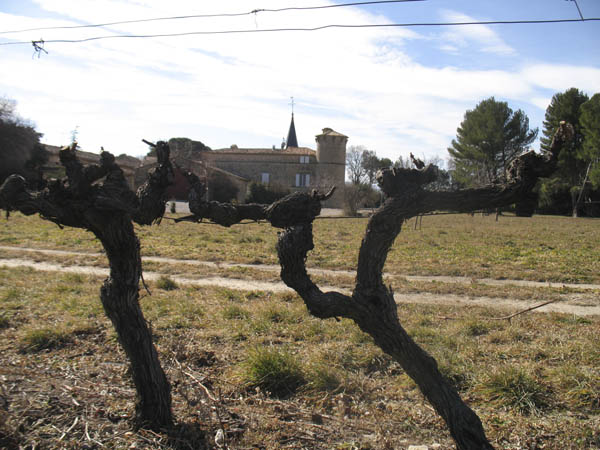
Soils here are fossil-infused limestone, farmed ‘lutte raisonnée‘ (“sustainable” farming), canopies left to go wild as the regular winds keep things healthy, and are hand-picked though otherwise mechanically worked. All five traditional reds are grown for the three bottlings which we tried over lunch cooked by Charlotte in their dining room. No regular employees, another aspect which allows Isabelle the opportunity “to show the real French ‘ame‘ (soul)” she so much enjoys. This hospitality extends to the four rooms to rent in the chateau, something which likely brings in more profit than wine.
As for the wines, a fine example of their aging potential is the La Baronnie 1998. Its nose of sweet plum, garrigue, earth, animal, light brown spice, and a touch of truffle aromas was alluring while still on the palate upswing with plenty of tannin, black fruit, and leather.
Château de Jonquières
26 Grand Rue
34725 Jonquières
Tél.: +33 4 67 96 62 58
www.chateau-jonquieres.com
Mas de l’Écriture
After 20 years as a lawyer for an airline, Sète-based Pascal Fulla started his estate in 1999 as a way to channel his “capacity for life’s expression artisanal and a family business” one which he was sharing that day with his adult daughter Léa and their bulldog Winston.
Organic since 2007, now in transition to fully biodynamic, a task easily reached as demonstrated by the strong, constant wind under perfectly blue skies and 65F (18C) temperature greeting me in February upon my arrival at his vineyard-surrounded winery. All five varieties, the largest bit of which is Syrah, are planted totalling 25 acres (10 ha).
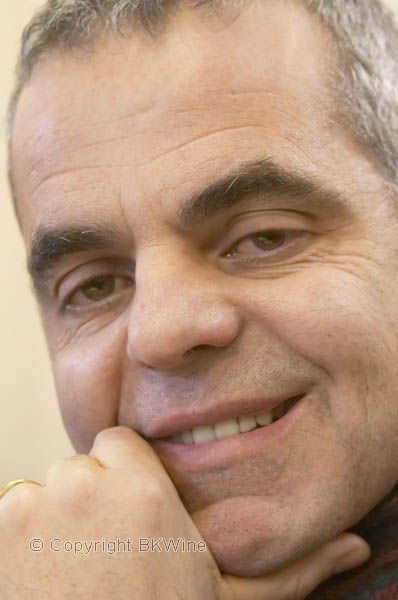
Each parcel is vinified as per variety, transferred later to barrels, married only when ready to assemble the three house blends. 10-20% of his 600l demi-muid Seguin-Moreau (with which he partnered in developing barrels specifically for Languedoc varieties) barrels are replaced annually. Confident to this departure he said, “when you put wines in large barrels you avoid wood aromas.”
The immaculate cellar features a top-gauge metal basket press. Fulla gives a long 8-10 week maceration. Later the must is pressed while undergoing malolactic because “our grapes are healthy enough we can do this.” Low-yielding vines optimize the minimal amount of rain which comes; short pruning, shoot thinning, training vines to go within rather than outside the canopy, green harvests, hand-harvests by variety as to each one’s ripeness. All wines are bottled unfiltered and unfined. Fulla has been helped along from the beginning by Patrice Giorello who does all the heavy lifting.
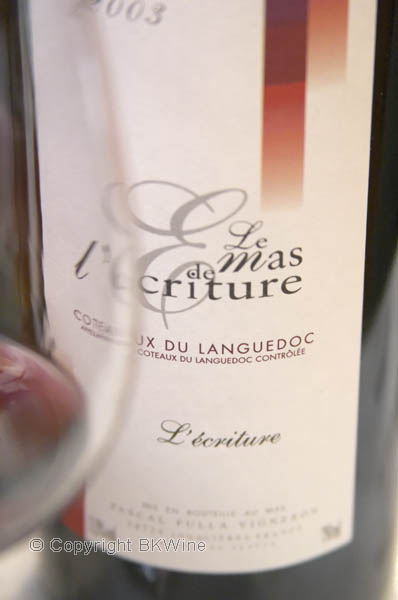
The wines reflect his philosophy, or the reverse, that they should all be treated equally for what they are so selections are based upon suitability rather than exacting from the grapes selections in which one may outshine the other. That said the Mas de l’Écriture wines reflect a broad mid-palate as if Michel Rolland had consulted here.
Mas de l’Écriture
93 Chemin la Frigoule
34200 Sète
Tél.: +33 4 99 57 61 54
www.masdelecriture.fr
Mas Cal Demoura
While sitting in the middle of his vineyards Vincent Goumard of the winery which translates into ‘one must remain’ told me that “Terrasses du Larzac’s story is more than the terroir normally associated with wines. It’s also about the richness and diversity of its people. Diversity can be something that fosters the development of an appellation. If you look at Châteauneuf du Pape it’s got a specific character but also differences between players such as Rayas, Beaucastel, Ogier. There has to be some balance between consistency and diversity.”
Once an accounting consultant for Arthur Anderson before training in Dijon then coming here with the intention of making “fantastic wines from terroir available at a fair price. It’s easier to do something with a story in an area going through a qualitative revolution rather than in a region which has been good for decades. Integrating here has been easier than had I gone to a great Bordeaux appellation. Luck had a lot to do with it but I knew after coming the first time that this is where I wanted to be.”
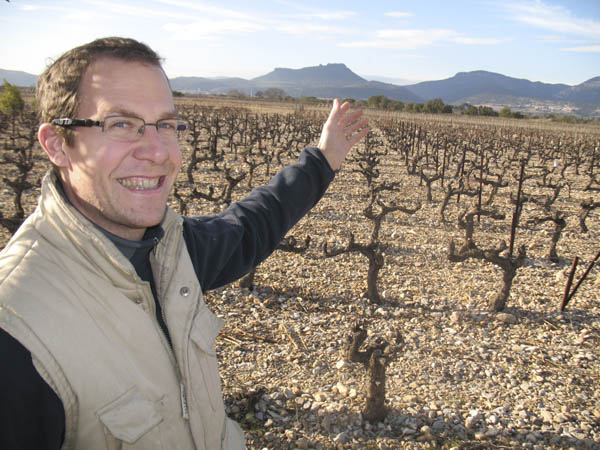
Goumard told me the story of how Olivier Jullien and his father Jean-Pierre sold him the 17-acre (7 ha) Les Combariolles site, something the father had nurtured for a quarter century. Olivier thought he had nothing more to give this amazing site and wanted to pass it on to someone who did, even though he is making great wine from a variety of parcels around Jonquières. In addition to the famed Combariolles he farms another 12-acre (5 ha) site around Jonquières with vine age ranging 12-54 years with an average of 35. He grows organic in transition recognizing that although they have frequent oidium issues in the spring, the Languedoc is far better suited to organic viticulture than more northern areas.
Goumard keeps the acidity in his wines during the warmer years by paying close attention to his picking times. He macerates 25-35 days with little manipulation after the initial pigeage.
Mas Cal Demoura
3A Route de St André
34 725 Jonquières
Tél.: +33 4 67 44 70 82
www.caldemoura.com
Mas Jullien
Olivier Jullien is a big fan of oak as evidenced by his cellar full of disparately-sized new and shortly-used barrels though his house style reflects a concentrated fruit direction. A tank sample of a 200-400m terraced schist-grown blend showed a high level of brett – weird – though a 2011 Syrah with a touch of Grenache possessed mild tannins and a shockingly long finish considering its youth.
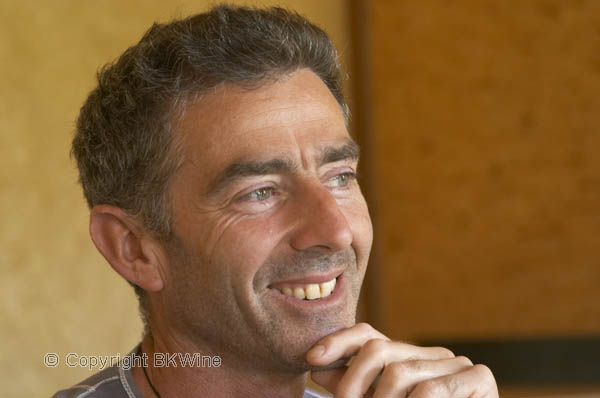
A spirited, slight guy with a distinct twinkle in his eye who is “looking towards a star” rather than growing vines and making wines according to a plan. Following the barrel tasting we plowed into a short tasting of older wines. Jullien has been growing ‘de facto’ organically for too many years to recount.
Mas Jullien
4 Chemin du Mas Jullien
34725 Jonquières
Tél: +33 4 67 96 60 04
This is the third of four articles on the wines and wine producers in the Terrasses du Larzac. Read more here:
- Part 1: Terrasses du Larzac in the heart of the Languedoc wine region
- Part 2: Terrasses du Larzac wine producers (1): Mas des Chimères, Mas Conscience, La Pèira en Damaisèla, Le Clos du Serres
- Part 3: Terrasses du Larzac wine producers (2): Château de Jonquières, Mas de l’Écriture, Mas Cal Demoura, Mas Jullien [this article]
- Part 4: Terrasses du Larzac wine producers (3): Domaine du Pas de l’Escalette, Domaine de la Sauvageonne, Vignes Oubliées
(*) This article is a modified version of a text that was originally written as a “postcard” feature for The Sommelier Journal in the USA. Republished with permission.
If you want to know more about the wines and wine producers in the Languedoc you can read BKWine’s Languedoc book with Britt and Per Karlsson. But unfortunately it is currently only available in Swedish.
[box type=”info” style=”rounded” border=”full”]
Languedoc is one of the most exciting wine regions in France, full of young and entrepreneurial winemakers. If you want to experience it up-close, meet the winemakers, taste the excellent wines and enjoy the food you can come on a Languedoc wine tour with BKWine.
Travel to the world’s wine regions with the wine experts and the specialist in wine travel.
[/box]




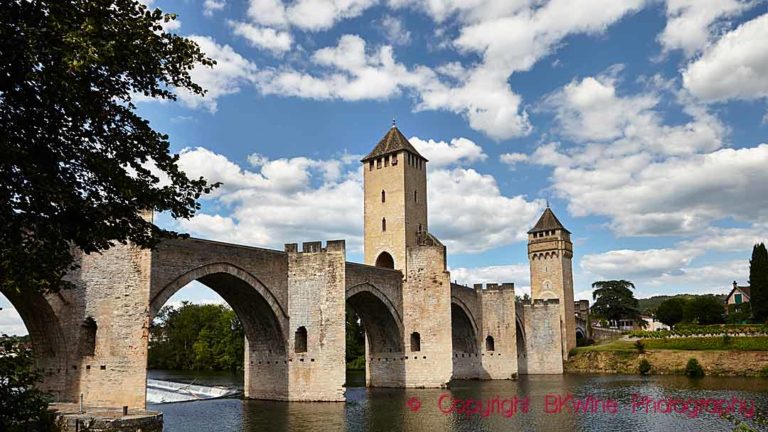
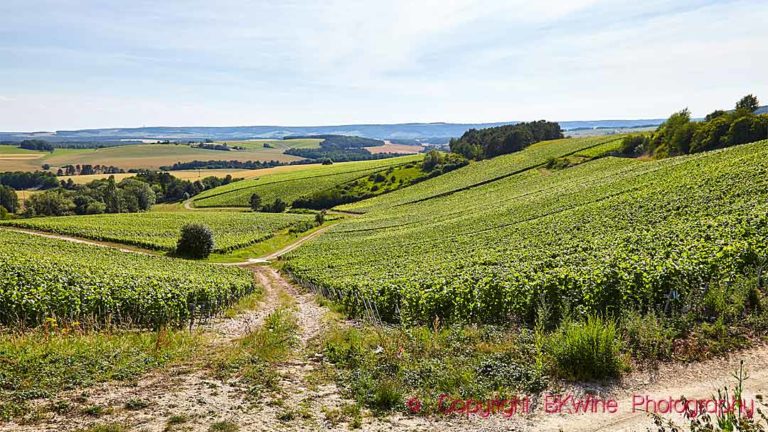





One Response